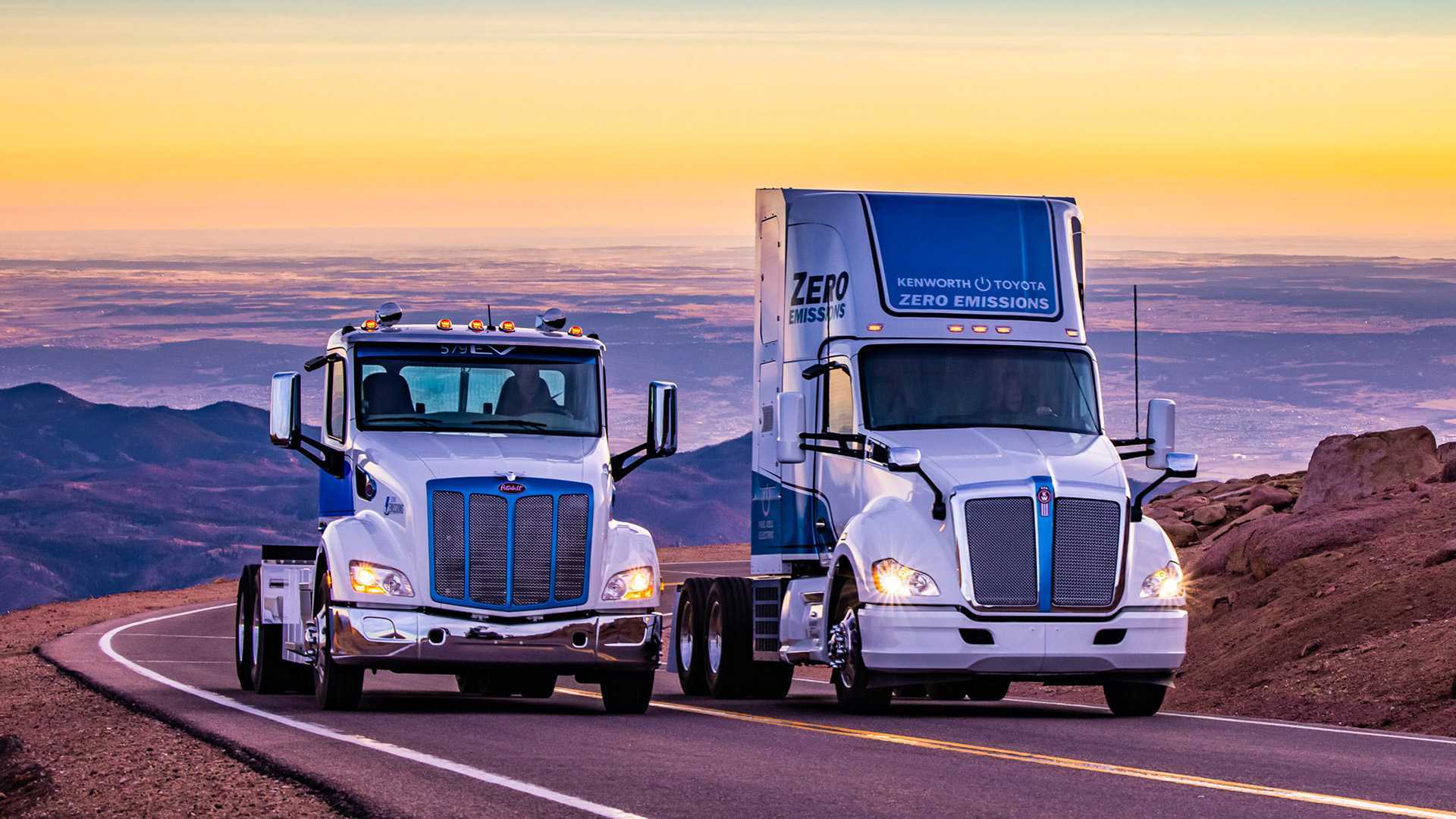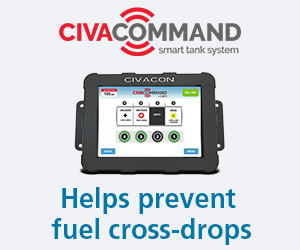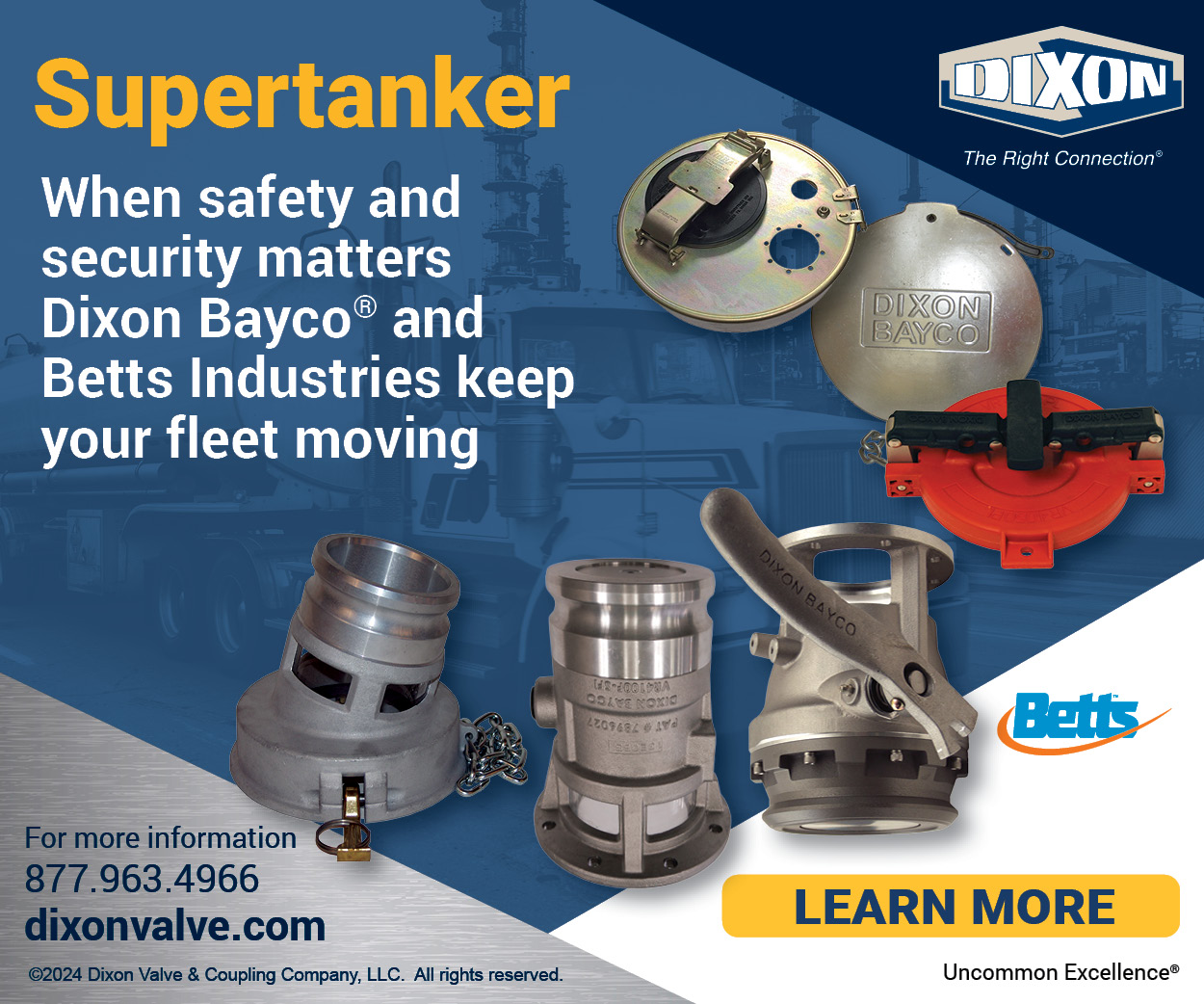The Future of Transportation: Hydrogen Fuel Cell Trucks
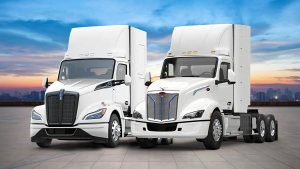
Truck manufacturer Paccar Inc. and global automaker Toyota Motor Corp. are moving forward with a partnership to produce fuel cell electric Class 8 trucks for the North American market.
In a significant expansion of their collaborative efforts, Paccar and Toyota are set to produce zero-emission, hydrogen fuel cell Kenworth and Peterbilt trucks powered by Toyota’s advanced hydrogen fuel cell modules. This development further underscores the growing significance of hydrogen fuel cell trucks in the transformation of the transportation industry.
Unveiling the Kenworth T680 and Peterbilt 579 Hydrogen Fuel Cell Models
The expanded agreement is crucial in the ongoing development and commercialization of the Kenworth T680 and Peterbilt 579 models. These trucks, characterized by Toyota’s hydrogen fuel cell powertrain kit, epitomize the potential of hydrogen fuel cell technology in the commercial vehicle sector.
A Successful Pilot Program at the Port of Los Angeles
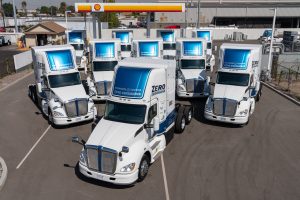
Designed for heavy-duty commercial vehicles, Toyota’s fuel cell electric powertrain kit recently earned the Zero Emission Power-Train certification from the California Air Resources Board (CARB).
Paccar and Toyota have been working together on fuel-cell electric vehicles (FCEV) for several years. One of their notable successes is a pilot program that deployed 10 Kenworth T680 hydrogen fuel cell trucks at the Port of Los Angeles. The real-world feedback from this program has proved invaluable in enhancing the performance and range of these vehicles.
Enjoying our insights?
Subscribe to our newsletter to keep up with the latest industry trends and developments.
Stay InformedEarning the CARB’s Zero Emission Power-Train Certification
Designed for heavy-duty commercial vehicles, Toyota’s fuel cell electric powertrain kit recently earned the Zero Emission Power-Train certification from the California Air Resources Board (CARB). This certification is a testament to the potential of hydrogen fuel cell trucks in promoting sustainability.
Kenworth T680 Hydrogen Fuel Cell Commercialization Plans
Kenworth has already started accepting deposits for its first zero-emission Class 8 hydrogen fuel cell truck. At the Advanced Clean Transportation Expo in Anaheim, California, the company announced its plans to start producing the T680 hydrogen fuel cell electric vehicle, powered by Toyota’s fuel cell technology.
Initial Customer Deliveries and Future Serial Production
The initial customer deliveries of these revolutionary hydrogen fuel cell trucks are planned for 2024, with serial production set to begin in 2025. Kenworth dealers across the United States and Canada are now accepting deposits for the first batch of these T680 FCEV builds.
Design and Performance: The Kenworth T680 FCEV
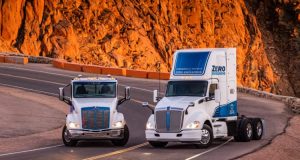
The T680 FCEV, built in close collaboration with Toyota, integrates the latest advancements in hydrogen fuel cell technology. It boasts a driving range of up to 450 miles, depending on driving conditions, offering one of the longest driving ranges among zero-emission trucks.
The T680 FCEV, built in close collaboration with Toyota, integrates the latest advancements in hydrogen fuel cell technology. It boasts a driving range of up to 450 miles, depending on driving conditions, offering one of the longest driving ranges among zero-emission trucks.
Toyota’s 310kW Dual Motor Assembly and Gen 2 Dual Fuel Cell Module
The T680 FCEV is equipped with Toyota’s 310kW Dual Motor Assembly, capable of providing 415 horsepower continuously at a maximum payload of 82,000 pounds. This powerful system is complemented by the Toyota Gen 2 Dual Fuel Cell Module, a key component that further enhances the truck’s performance and efficiency.
Peterbilt’s Embrace of Hydrogen Fuel Cell Technology
Peterbilt is also incorporating hydrogen fuel cell technology into its heavy-duty truck lineup, with the zero-emission vehicles slated for availability in 2025. This move marks another major step forward in the proliferation of hydrogen fuel cell trucks.
Leveraging Lessons from Previous Hydrogen Fuel Cell Projects
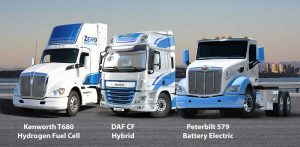
Hydrogen represents the best zero-emission technology solution for long-distance Class 8 trucks where range, weight, capacity and refueling downtime are critical.
Peterbilt is capitalizing on the experiences and insights gained from Paccar’s earlier hydrogen fuel cell projects. The aim is to broaden the range of zero-emission powertrain solutions available to customers, bolstering the position of hydrogen fuel cell trucks in the market.
The Role of Hydrogen Fuel Cells in Longer-Range Applications
According to Scott Newhouse, Peterbilt’s chief engineer, hydrogen fuel cells are an excellent solution for longer-range applications. They power the vehicle and recharge the batteries in the propulsion system, providing more range without additional battery weight.
“The fuel cell is designed to power the vehicle and recharge the batteries in the propulsion system, providing more range without additional battery weight. We are designing these advanced vehicles for optimal performance in longer-haul applications.”
Designing Advanced Vehicles for Optimal Performance
Peterbilt is designing these advanced vehicles to achieve optimal performance in longer-haul applications. The company’s partnership with Toyota is set to deliver one of the most advanced fuel cell powertrains in the industry, setting new standards for hydrogen fuel cell trucks.
With these plans, Paccar and Toyota are positioning themselves at the forefront of the shift towards zero-emission vehicles. By leveraging hydrogen fuel cell technology, they are not only transforming the transport industry but also contributing significantly to environmental sustainability.
To sum up, the future of transportation looks bright with the advent of hydrogen fuel cell trucks. As Paccar and Toyota continue to innovate and lead the charge, we can look forward to more breakthroughs in the years to come. From improved performance to longer driving ranges, the possibilities are indeed exciting.
Summing Up: Paccar and Toyota’s Quintessential Contributions to the Evolution of Hydrogen Fuel Cell Trucks:
- Collaborative Effort for Zero-Emission Trucks: The major game-changing contribution by Paccar and Toyota is their decision to produce zero-emission, hydrogen fuel cell Kenworth and Peterbilt trucks. This marks a significant expansion of their collaborative efforts, paving the way for greener transportation.
- Successful Pilot Program: Their successful pilot program at the Port of Los Angeles, which deployed 10 Kenworth T680 hydrogen fuel cell trucks, provided invaluable real-world feedback that enhanced the performance and range of these vehicles.
- CARB’s Zero Emission Power-Train Certification: Toyota’s fuel cell electric powertrain kit, designed for heavy-duty commercial vehicles, recently earned the Zero Emission Power-Train certification from the California Air Resources Board (CARB). This shows their commitment to sustainability and technological advancement.
- Commercialization Plans: Kenworth has started accepting deposits for its first zero-emission Class 8 hydrogen fuel cell truck. The company announced its plans to start producing the T680 hydrogen fuel cell electric vehicle, powered by Toyota’s fuel cell technology, signifying the commercial viability of these vehicles.
- Technological Innovation: The trucks integrate the latest advancements in hydrogen fuel cell technology, featuring a driving range of up to 450 miles and a powerful Toyota’s 310kW Dual Motor Assembly. This demonstrates the companies’ focus on technological innovation and their vision of an emission-free future.
PACCAR is a global leader in commercial vehicle manufacturing, known for its premium brands such as Peterbilt, Kenworth, and DAF. The company prioritizes innovation, fuel efficiency, and sustainability, offering reliable and technologically advanced trucks. With a strong global presence and a commitment to customer satisfaction, PACCAR continues to shape the future of commercial transportation.
Toyota HD Trucks are a robust and versatile lineup of heavy-duty trucks designed for demanding commercial and industrial applications. With a focus on performance, durability, and safety, Toyota HD Trucks deliver exceptional towing and hauling capabilities while providing a comfortable and ergonomic workspace for drivers. Toyota’s commitment to innovation and sustainability ensures that their HD Trucks incorporate advanced technologies and eco-friendly options, making them reliable solutions for heavy-duty transportation needs.
Delve Further into Associated Subjects:
- Explore More on Fuel Cell Technology in the Transportation Sector.
- Get the Latest News and Updates from Paccar
- Get the Latest News on Emissions Regulations in the Transportation Industry
- Stay Updated on the Latest Developments in Trucking Technology
- Stay Informed on the Latest Updates from Paccar and Toyota and other HD Truck Mfgs
Dive Deeper into Industry Information:
- Toyota’s Official Website – Discover Toyota’s vision and commitment to hydrogen fuel cell technology.
- Paccar’s Official Website – Learn more about Paccar and their innovative approach to truck manufacturing.
- Advanced Clean Transportation (ACT) Expo – Explore North America’s largest fleet technology event where the latest advancements in clean transportation are showcased.

